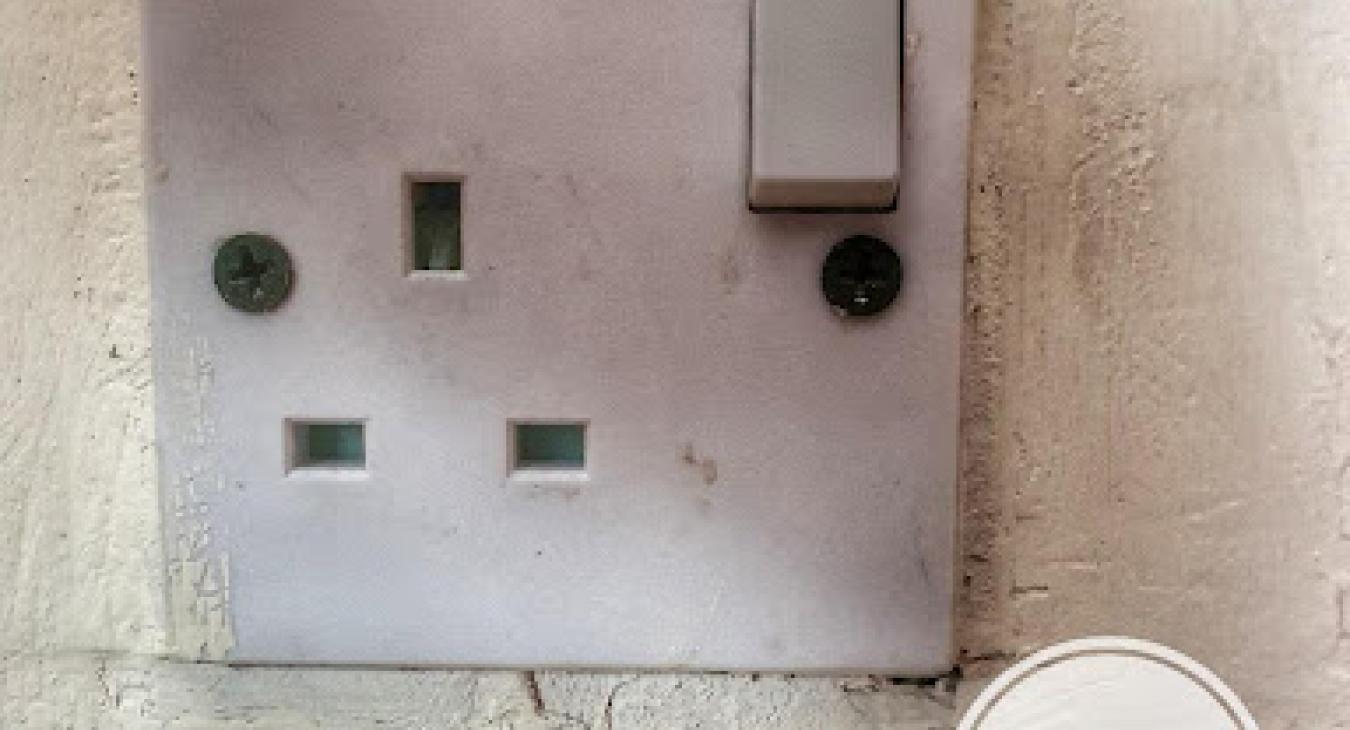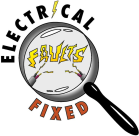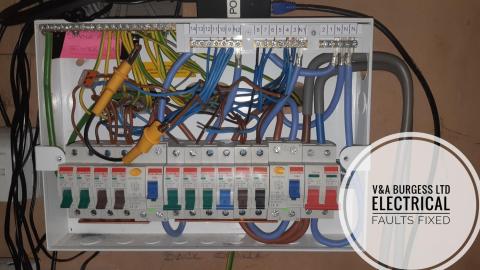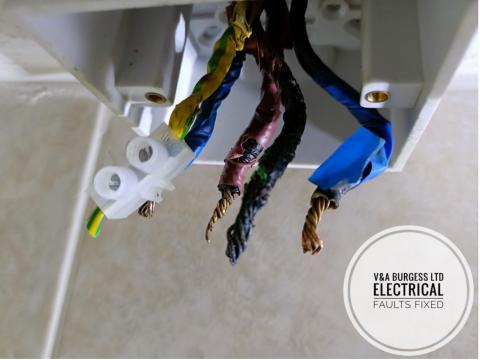
1) Why are my sockets tripping?🤔
If you have sockets tripping, switches tripping, plugs blowing, electric fusing or pops and bangs then you have electrical problems. There are several electrical problems that can cause sockets tripping and electrics to blow so it’s always best to have a professional out to investigate for you. We NEVER recommend attempting to fix electrical faults on your own as there are many hidden dangers within wiring systems and only a professional has the correct tools, equipment, and knowledge to ensure safe working around electrics.
There are various reasons why sockets could trip:
- Faulty socket
- Faulty switch
- Faulty appliance
- Faulty cabling
- Faulty trip switch
- Water ingress
- Rodent damage
- Overload on the circuit
- Incorrect fuse or circuit breaker
- Poor electrical work
- Accidental damage
We are often asked over the phone, what we think the problem might be and what it is likely to cost to fix. These are two impossible questions to answer and yet we are often met with suspicion when we cannot give a price for a repair. ☹ Typically, to sort out these kinds of electrical issues, some electrical investigation work is necessary to find out what is happening on the affected circuit(s). Once this investigation work has been completed, we are able to offer a quote for repairs based on our findings. Unfortunately, the investigation work is not free as it can involve an hour or two of testing and investigation along with travel to your home and as such, we charge accordingly. Rest assured; we are actually very reasonable in our emergency call out charges. 😊
Back to top2) Faulty socket⚠️
Sockets can occasionally go bad. Internal connections can fail, moving parts inside can touch, water and dust can enter to cause absolute havoc and make the electrical system trip out. Excessive electrical load placed upon a socket can also cause premature failure. When there is a lot of electrical current demand through a socket, the socket can heat up, plastics can melt and connections can become shorted out causing the electrical system to turn off. If you suspect that a socket is faulty, do not use it and contact an electrician immediately.
Back to top3) Faulty Switch⚠️
There are many different types of switches in our homes and they can all fail in their own special ways. Shower switches regularly fail and can cause complete power loss including sockets depending upon how your electrical system is set up.
Fused switches can overheat if the electrical load demanded from them is too much. Many of these fused switches are wired onto the same electrical circuit as the plug sockets and as such, a failure on one of these switches will tend to cause the whole circuit to trip causing sockets tripping and possibly other electrical circuit failure.
Back to top4) Faulty Appliance⚠️
Faulty appliances are often the guilty party in a socket failure situation. Whether they cause an individual socket to stop working or a whole circuit, they are often the culprit. An appliance with loos wiring in the plug or loose wiring at the socket can cause a socket to overheat and fail. A worn-out socket can fail on its own especially with a high-powered appliance plugged in and used.
Appliances that go faulty internally can cause certain trip switches in the consumer unit / fuse board to trip. This can result in power loss to several circuits in the property or total power loss depending upon how your electrical system is set up. If you find that you are having tripping problems then the first step is usually to disconnect all plug sockets and see if that enables you to reset the trip switch.
Back to top5) Faulty Cabling⚠️
Occasionally cables can fail. Typically, this occurs in older cabling and where cables have been previously abused or damaged. The insulation that protects the copper inside the cable can fail. When this insulation fails, there is often either excessive electrical current that goes missing or shorting out where two wires touch. Neither of these situations is very good and can cause sockets tripping.
Cables can only really be checked for faults by an electrician. Cables can fail with no obvious external signs. I recall a cable under a loft ladder that was repeatedly bashed as the loft ladder was inserted into the loft. The cable had no signs of visible damage externally but when I cut the suspected section out and tested it, it was ruined. This was repaired by joining the cable and replacing the affected section but to look at the cable, you would never have known.
Back to top6) Faulty Trip Switch⚠️
Occasionally a trip switch can go bad. There are a few ways that this can happen. Internally, there is a lot going on inside a trip switch and its surprising and a testament to engineering that these things do not fail more often. The most recent trip switch failure was due to an internal spring failure on a 40-year-old switch. The switch would trip even with the power turned off. 😊 Fortunately, we had a replacement for just this type of emergency situation.
Trip switches have the job of dispersing large electrical fault currents and when this happens, a lot of electrical force is removed from the circuit using the internals of the switch. This can take its toll on these small devices and as such they do occasionally refuse to stop working.
7) Water ingress⚠️
Nothing plays havoc with electrical systems quite like water ingress into things. Many a time we are called to electrical installations where pond pumps have let water into themselves, outdoor sockets have flooded and security lights are sodden.
Water entering into electrical accessories will make a modern consumer unit trip in many cases but also risks arcing and potential fires. If you have sockets tripping then it is often the outdoor electrics that are the cause. It is usually best left to an electrician to investigate using their test equipment and knowledge.
Back to top8) Rodent Damage⚠️
Yep. Mice, rats, and other creatures just love a good nibble on an electrical cable. It is not uncommon to find that these little critters have found their way into lofts, consumer units and other areas where electrical cables might be and cause absolute mayhem. If rodents have infested the house at some point, then it is highly likely that a full rewire of the electrical installation may be necessary. I have seen cables stripped back to copper by rats and mice rendering the cables absolutely lethal and of course, useless.
An electrical inspection is required following such infestation on an electrical installation. Contact us if you require this service. ☹
Back to top9) Overload on the Circuit⚠️
When electrical circuits become overloaded, they are demanding more electrical current and using more power than the electrical designer of the installation intended. This causes the trip switch in the consumer unit to trip or the fuse to blow and could mean the sockets tripping. If this happens regularly then you will need an electrician to visit to investigate the cause. It could be that there are simply too many appliances plugged in and in use and your electrician should have the correct test equipment to check for this. It could also be that there is an intermittent fault on the circuit causing massive overload and tripping. Either way, a professional investigation is usually the way to get it solved.
Back to top10) Incorrect fuse or circuit breaker⚠️
When the incorrect fuse or circuit breaker is used to protect the cables on an electrical circuit there can be issues. Using a fuse that is too highly rated means that it will not trip when there is an overload. This may seem great as you can use lots of appliances and never have a fuse blow or circuit breaker trip but the likelihood is a serious fire risk as the cables are overloaded and without protection. Cables are designed to carry so much current depending upon their installation method and the electrical designer takes this into account when designing your electrical system and protects them accordingly with the correct sized circuit breaker at the consumer unit.
If, on the other hand, the circuit breaker or fuse is too small then the chances are the fuse will blow regularly or circuit breaker will trip regularly causing nuisance tripping and annoyance.
11) Poor Electrical Work⚠️
We all rush on Friday afternoons 😊 but that is no excuse for carrying out poor electrical work. When electrical work is carried out poorly it breaches regulation 134.1.1 of BS7671 Requirements For Electrical Installations. This and many other regulations are in place to ensure the safety of wiring systems for the occupants of properties and the users of the electrical installation.
Whilst the cheapest quote may be tempting to save some money, it all too often means that job will be done poorly, corners cut and wiring regulations ignored. This will inevitably cost more money in the long run and cause further issues. Always check the online reviews of your electrician to ensure that they have many previous satisfied customers.
We are NICEIC registered, insured, experienced and qualified meaning we can safely carry out electrical work in your home and our work and knowledge is assessed annually by the NICEIC.
Back to top12) Accidental Damage⚠️
When accidental damage happens to wiring, there can be all sorts of issues that then occur. The most common form of accidental damage is cable damage in a wall by a drill. The Saturday afternoon call to us from a panicked customer that has drilled through a cable and has sockets tripping because of this is very common. We can normally repair and make safe the same day though 😊
If you are having issues with sockets tripping then do not be afraid to get in touch, live chat, contact form on the website or telephone. We are available to attend electrical emergencies 24/7 between Liverpool and Leigh and all surrounding areas so don’t sit in the dark worrying.
Back to top









